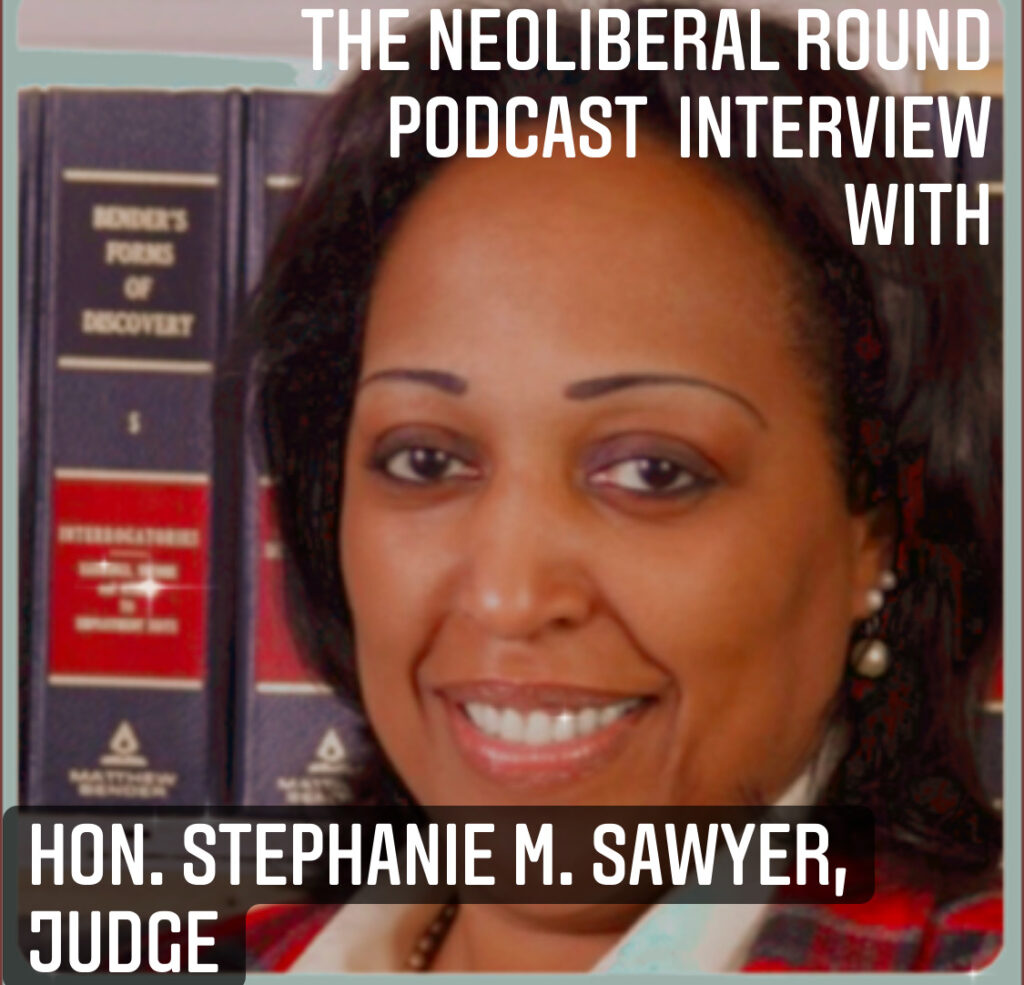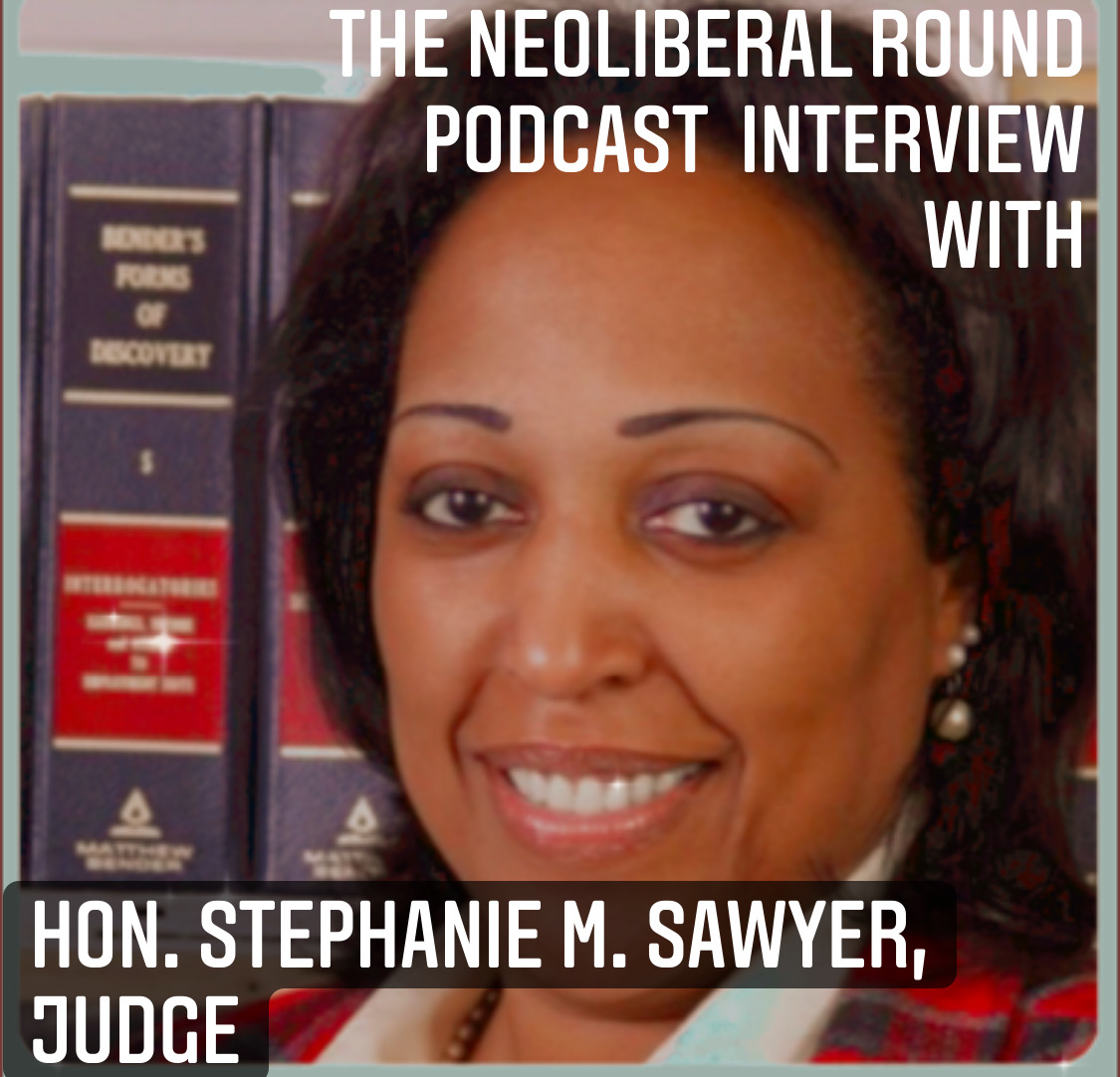Judge Hon. Stephanie M. Sawyer is trying to make a difference in Philadelphia and stated that once she got elected to the Bench, as a Municipal Court Judge, the first thing she said to herself was that she was not going to be the kind of Judge that was going to “feed the beast that was mass incarcerations.” In fact, Judge Sawyer revealed that, “that is how the system currently operates,” but stop short of providing any further comments on the issue and decided to table her opinions on the matter for later.
Nevertheless, Judge Sawyer went onto explain that the general path when someone gets convicted, except for “Intentional Carve Outs…,” Ms. Sawyer, interrupted her chain-of-thought to explain what is meant by Intentional Carve Outs, which is important to understanding the point she was about to make concerning the general path when someone gets convicted in relation to her goal as a Judge to not allow herself to “feed the Beast” that was mass incarceration. According to Judge Sawyer, “Carve Outs” are things such as ARD – Accelerated Rehabilitated Disposition. For example: “they say if you have a zero prior record score, we are not going to put you through the criminal record system and we are going to give you a different path. They have drug treatment court, so because you’re a drug addict we are going to carve you out of the Criminal Justice System and treat you in this manner, or Veteran’s Court, because you’ re a Veteran we are going to carve-you-out of the Criminal Justice System and treat you in this path, or Mental Health Court, because you have mental health problems, we gonna carve you out of the Criminal Justice system….”
Who is Hon. Juliet M. Sawyer?

Judge, Court of Common Pleas
Although Stephanie M. Sawyer was born in Queens, New York, her home city is the City of Philadelphia where she was raised and has continuously lived since, she was a very little girl. She is a product of the Philadelphia public school system attending J.R. Masterman, Philadelphia High School for Girls, and she went on to earn her undergraduate and law degrees from Temple University. Judge Sawyer is a single parent of two children who was raised by a single parent where she learned her commitment to the community and her understanding that hard work is the key to success.
Judge Sawyer is currently a Municipal Court Judge in Philadelphia County, having her judicial nomination confirmed by the state senate on June 30, 2014, she was then sworn in on July 16, 2014. Prior to this appointment, Judge Sawyer was the sole practitioner of her own Center City based law office which she maintained for almost two decades.
Judge Sawyer then went back to where she had left off, when she was commenting on the general path when someone gets convicted, except for intentional “Carve Outs,” pointing out that:
the Criminal Justice system works like this, “a Judge will sentence somebody to probation and flog-them-off to probations or flog-them-off to probation officers, or they’ll sentence them to Incarcerations and flog-them-off to the Department of Corrections and [over ninety percent] (90 %) get out. Then they get flogged off to Parole Officers. And the next time that Judge who sees the person they sentenced, will be when a Probation/Parole Officer is so frustrated that they opine revocation, because the Defendant [or Parolee] is either not doing what the Probation or Parole Officer asked them to do or have a new case, or has a new conviction. In those three (3) circumstances, a Probation/Parole Officer will request a “Violation of Probation Hearing” to recommend additional punishment. And the next time a sentencing Judge sees a person that they had sentenced, is when that happens – [meaning Revocation, Re-incarceration leading to Mass Incarceration]. And because they [the sentencing Judge] does not have any experience with the person, they would naturally follow what the Probation or Parole Officer [recommends]. So, the next time that the Judge sentenced you, see’s you, it’s time to sentence you again”.
This led her to a very important conclusion couched in a question, “so if Judges sees people only to punish people, when exactly do they help?” As such, Judge Sawyer explains that she has created a system, a program called “Resource-Based Sentencing and Supervision”; indicating that “it’s how you sentence and it’s how you supervise. In that model, Judges are part of the solution. They are actually there to help. When I’m sentencing somebody, let’s say I’m sentencing somebody with possession with intent to deliver, [who has] a tenth (10th) grade education…, I have to sentence him to get his high school diploma, I have to sentence him to figure out what kind of buy-in he needs to have a legitimate income”.
This seem to come from her own personal experiences and encounters in her community and the need to be part of the solution given the mounting crime and violence and mass incarceration of young men who are largely uneducated or lack legitimate income generating opportunities stemming from limited to poor educational outcomes and financial/business literacy. The Honorable judge went on to share a situation from her own encounters living in Philadelphia. Judge Sawyer stated that:
“Most of my corner boys, they are frustrated entrepreneurs, if we give them a change of product, then we’d be actually doing something. So, [we help to cultivate] their entrepreneurial spirit and we actually have resources, boot camps, to [teach them] how-to get LLC’s… how-to open up businesses and how-to do a quarterly profit and loss statement….” At this point, the host, Renaldo interjected, adding, “and how to access funding as well…” Judge Sawyer continues… “and how to access funding…” but added that “access of funding starts with financial literacy and understanding what happens with the dollar. Further, understanding how credit works, the ‘rule of 72’ – the point of how money flips. So, financial literacy is the first step, into showing people how-to have access to money, because they don’t understand how-to get to it first or know how to grow it. So, those are some of the things/resources we give in Resource-based Sentencing and Supervision.”
In fact, Judge Sawyer stated that she has been practicing Resource-based Sentencing and Supervision in her courtroom since 2018, although she did not have a name for it. However, Judge Sawyer announced that since 2022, they launched the Sentencing Foundation, which is intended to be “the logistical support for Resource-based Sentencing and Supervision such so that it can be in every jurisdiction- state, federal, big cities, rural – that’s what the Sentencing Foundation is intending to do, that’s what we’re working on building on right now. So, it will usher in a cultural shift in jurist to be part of the solution instead of always showing up to punish but to help folks. “
We then shift gears when Renaldo the host commented that, “this is what Philly needs” and pointed out that “some Philadelphians have said, on the show, the Neoliberal Round Podcast for the series “What’s Life Like Living in Philadelphia” that we need a fathers’ movement, as we lack responsible fathers/parents, or social media and social decay, lack of resources etc. are part of the problem in communities with high crime and violence. Judge Sawyer agreed but added that the reasons for the problems are all of the above, emphasizing that “I don’t know why anybody would want to point out something as one good reason and say that’s the magical problem and sprinkle magical dust on the problem. There’s no such thing. Renaldo interrupted, “so you think it’s multi-faceted?” The Judge continues, agreeing that “it’s a multifaceted problem. Therefore, as a judge trying to promote a mechanism for judges to use that will help greatly reduce recidivism, and so every individual in their own lane, in their own right. We need to have people that promote good parenting. We need to have people that promote trauma counseling, because a lot of people I see [seem to be dealing with] Post Traumatic Stress Disorder (PTSD). So, hurt people, hurt people. So, when you take a bunch of traumatized people and sprinkle guns all over the place what do you think is gonna happen?
Judge Sawyer continues, “it’s a shame, but it’s not surprising [speaking about guns in the hands of those dealing with mental health and trauma] it’s really not. If you look the mass incarceration in the 80’s and 90’s, it’s not surprising and the crack epidemic came out… but generations in the 80’s and 90’s their kids raised themselves and now we are two generations past that; why are people surprised at how desperate things are getting, it makes complete and perfect sense to me. Desperate people make really bad decisions. Therefore, if you want to effectuate a [bad situation] you have to start by making people not desperate. Desperate people don’t have the mental clarity to make a decent decision.
As she makes her case for the importance of having a Resource-Based Sentencing and Supervision, she explained that there are two types of people: “Reactors and Actors. Actors put things into place because they thought things through and for them life is like a chess game. [On the other hand,] Reactors are just [opposite] there’s a brick coming, duck, there’s a fire coming, put it out. Reactors are just reacting to the situation in front of them without the opportunity to think about what they want to do.
Renaldo, the host, then shared an experience “working with college freshmen to develop a college mindset for learning success as they begin their first journeys in college, facilitating critical thinking, developing a college mindset…,” “and problem-solving mechanism…,” the Judge picked up the conversation at this point stating that because “life is nothing but a series of problems and how you problem-solve will definitely dictate your level of success.”
Therefore, inclosing, after such a powerful and passionate argument, making her case for a Resource-Based Sentencing and Supervision program, it was not surprising that the Judge would conclude the interview by sharing well-needed and impactful effort that she and her team are embarking on, if they can garner the support needed from donors and supporters, the launch of the “Sentencing Foundation a Non-profit Organization that [facilitates and sources] the resources that the Resources-Based Sentencing and Supervision needs…. The Launch will be by the first week in November. The Honorable Stephanie M. Sawyer, Municipal Court Judge of Philadelphia.
That concluded the interview with the Honorable Stephanie M. Sawyer, Judge in the Municipal Court Circuit, Philadelphia Pennsylvania, with host, Rev. Renaldo C. McKenzie, Author of Neoliberalism, Globalization, Income Inequality, Poverty and Resistance. Renaldo is also a Doctoral Candidate at Georgetown University and Graduated from the University of Pennsylvania with two masters. Renaldo is an Academic, visiting Lecturer at Jamaica Theological Seminary and other colleges, and is President of the Neoliberal Corporation – Think Tank, News Commentary, Digital Creators, Academics, Website Specialists, Writers/Editors, Podcasters and Publishers.

Visit The Neoliberal Corporation and check out our services, materials and archives for free!
Podcast: https://anchor.fm/theneoliberal
News Commentary: The Neoliberal Commentary
Website Host/Design etc. https://www.antzbusinesssolutions.com
Self-Publishing: Palmetto Publishing
Books/Materials/Journals/More News/Blog/Home: https://www.theneoliberal.com https://www.renaldocmckcnezie.com

